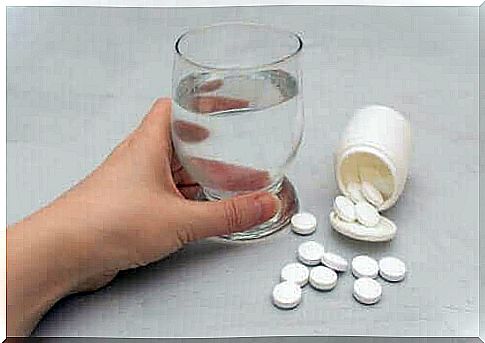On The Side Effects Of Antacid Overuse

Heartburn-relieving antacids are commonly used more than recommended. Because of their easy availability, antacids are considered a simple solution to upset stomach and the burning sensation caused by hyperacidity in the chest. However, they should not always be the primary treatment because of the risks of overuse.
What can be the side effects of antacid overuse? Why be careful with over-the-counter drugs? Although antacids rarely have side effects, their overuse can have serious side effects, which are discussed in more detail in this article.
What are antacids?
Antacids are gastric acid neutralizing preparations that work quickly. Thus, they facilitate significant burning and reflux in the esophagus. However, they are generally used more than recommended.

What are antacids and how are they taken?
Antacids consist of aluminum and magnesium salts, and chewable tablets or oral suspension are ingested internally. They are only suitable for adults and over 12 years old. Antacids can be taken up to eight grams per day for up to two weeks.
At least 2-3 hours should be allowed between taking antacids and other medications, and there should be a break of at least one hour after a meal. Antacids can be purchased without a doctor’s prescription. That is why it is important to know who they are not suitable for and what their consequences can be.
Drug overdose is at risk if the medicine is taken more than recommended in the dosing instructions or if it is used continuously for longer than recommended. Overdose can occur intentionally or accidentally. The risks of overuse of antacids are associated with excessive intake of aluminum and magnesium salts. At the recommended dosage, antacids are generally well tolerated and rarely cause mild diarrhea that resolves upon discontinuation of treatment.
What are the benefits of antacids?
Antacids are well suited for people with high blood pressure, among other things, due to their low sodium content. Because heartburn medications do not contain calcium, they also do not cause constipation. This applies to almost all antacid preparations.
What are the risks of antacid overuse?
Excessive use of antacids here means taking more than recommended or using it for too long. In the elderly, excessive use of antacids may exacerbate existing skeletal disorders such as osteoporosis and osteomalacia due to decreased phosphorus and calcium.
Likewise, in patients with diarrhea or malabsorption, on a low-phosphorus diet, or in very poor condition, antacids can cause, among other things, anorexia, muscle weakness, and osteomalacia.
In long-term use, aluminum salts tend to form phosphates insoluble in the intestine, which is poorly absorbed and excreted in the faeces.
Antacids are not suitable for people with any degree of kidney failure. Although antacids are available without a prescription, they should be used with caution. Excessive doses should be avoided as they may cause excessive accumulation of aluminum and magnesium ions in the body.

Antacids and other drugs
Antacids interfere with the absorption of many other drugs, so the rule of thumb is that they should not be taken at the same time as other drugs. Antacids impair the absorption of the following drugs:
- NSAIDs
- Gastric ulcer drugs
- Medicines containing digitalis from ringworm
- Chlorpromazine
- Lansoprazole
- Prednisone
Quinine reduces its excretion due to urinary alkalization, which may increase its toxicity.
Patients with Alzheimer’s disease should not be given antacids containing aluminum salts. Several studies have shown that aluminum affects the development of the disease as it accumulates in the nerve fibers of the brain tissue.
If heartburn symptoms do not improve or worsen after two weeks of taking antacids, you should see your doctor.









